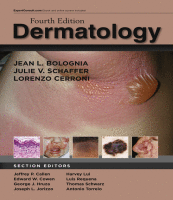Physical Address
304 North Cardinal St.
Dorchester Center, MA 02124

Key features ▪ Absorption of topical medications depends upon several factors, including cutaneous barrier function, the anatomic site, the active agent, and characteristics of the vehicle ▪ In neonates, there is a greater risk of systemic toxicity with use of…

Interferons Key features ■ Human cells produce three antigenically distinct forms of interferon (IFN), originally described as leukocyte (α), fibroblast (β), and immune (γ) ■ Recombinant DNA technology can produce large quantities of highly purified human IFN ■ IFNs have…

Key features ▪ Bacterial, fungal, and viral infections of the skin and soft tissue are very common ▪ Selection of the appropriate treatment depends on the infecting microorganism, the site and extent of the infection, and patient characteristics (e.g. age,…

Key features ▪ Retinoids are structural and functional analogues of vitamin A that exert multiple effects on cellular differentiation and proliferation, the immune system, and embryonic development ▪ Retinoic acid receptors (RARs) and retinoid X receptors (RXRs) are ligand-dependent transcription…

Key features ▪ Glucocorticoids continue to be among the most commonly prescribed anti-inflammatory agents in dermatology and all of medicine, with a large number of disorders responding to these drugs ▪ Proper use of systemic glucocorticoids requires a working knowledge…

Skin Barrier Matthias Schmuth Peter M. Elias Thomas J. Franz Jui-Chen Tsai Gopinathan K. Menon Kenneth R. Feingold Chapter Contents Stratum corneum structure and organization 2176 Epidermal metabolism and the skin barrier 2176 Impaired skin barrier and cutaneous inflammation 2179 The skin provides the largest interface…

Introduction As a dermatologist walks into the examination room of the patient in Fig. 123.1 , several diagnostic possibilities likely come to mind. The patient's history, additional physical findings, and other clues help narrow the differential diagnosis. In this case,…

Key features ▪ Cutaneous metastases are uncommon and rarely may be the presenting sign of an internal malignancy ▪ In general, cutaneous metastases are associated with a poor prognosis ▪ In women, breast carcinoma and melanoma are the malignancies that…

Benign Lymphocytic Infiltrates Lymphocytic Infiltrate of Jessner Synonyms ▪ Lymphocytic infiltrate of Jessner–Kanof ▪ Benign lymphocytic infiltrate of the skin ▪ Jessner lymphocytic infiltrate ofthe skin ▪ Jessner lymphocytic infiltration of the skin ▪ Jessner–Kanof lymphocytic infiltration of the skin…

Introduction The term cutaneous T-cell lymphoma (CTCL) describes a heterogeneous group of neoplasms of skin-homing T cells that show considerable variation in clinical presentation, histologic appearance, immunophenotype, and prognosis. CTCLs represent approximately 75–80% of all primary cutaneous lymphomas, whereas primary…